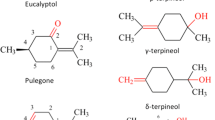Summary
Dehydration with 2,2-dimethoxypropane acidified with either 1 N HCL or 0.05 N HCL in an 1:100 ratio has been found to extract various biologically active lipids. The effect is enhanced by an increased proton concentration and seems to occur only after complete H2O transformation. It is suggested that lipid extraction is caused by a reoxidation of lower osmium oxides with subsequent attack on the unfixed lipids by the organic solvent DMP.
Similar content being viewed by others
References
Dierichs R, Dosche C (1982) Problems of the use of 2,2-dimethoxypropane as dehydrating agent in preparing single cells for electron microscopy. Histochemistry 74:263–269
Muller LL, Jacks TJ (1975) Rapid chemical dehydration of samples for electron microscopic examinations. J Histochem Cytochem 23:107–110
Stahl E (1967) Dünnschichtchromatographie. Ein Laboratoriumshandbuch. Springer, Berlin Heidelberg New York
Thorpe JR, Harvey DMR (1979) Optimization and investigation of the use of 2,2-dimethoxypropane as a dehydration agent for plant tissues in transmission electron microscopy. J Ultrastruct Res 68:186–194
Author information
Authors and Affiliations
Rights and permissions
About this article
Cite this article
Beckmann, H.J., Dierichs, R. Lipid extracting properties of 2,2-dimethoxypropane as revealed by electron microscopy and thin layer chromatography. Histochemistry 76, 407–412 (1982). https://doi.org/10.1007/BF00543960
Received:
Accepted:
Issue Date:
DOI: https://doi.org/10.1007/BF00543960




